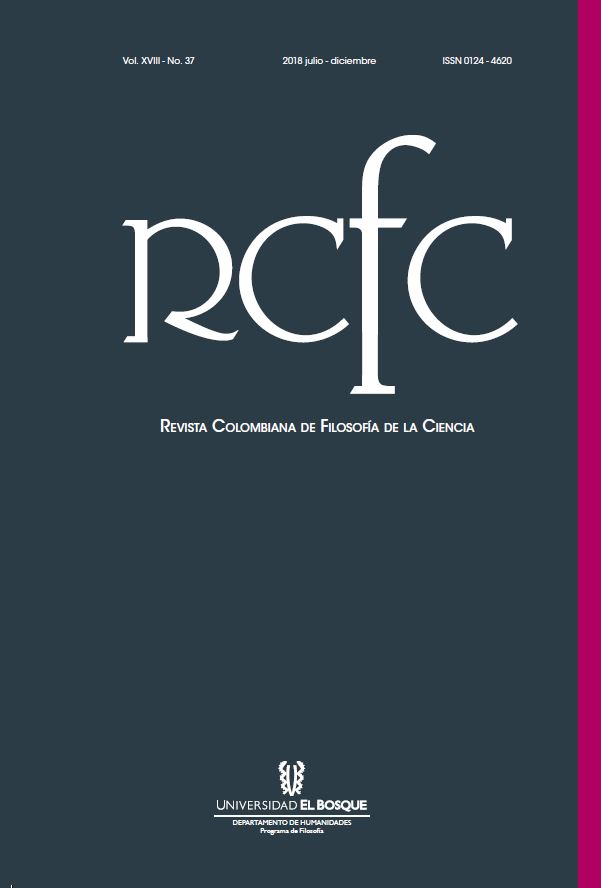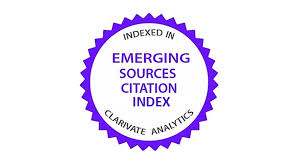Styles of reasoning, scientific practices and historical epistemology
a proposal to articulate the history and philosophy of science
DOI:
https://doi.org/10.18270/rcfc.v18i37.2572Keywords:
practical knowledge, normative horizons, norms and values implicit in practices, historicity of scientific rationality and knowledge, Ian HackingAbstract
It is analyzed, from a philosophical view, to what extent the styles of scientific reasoning (ssr), proposed by the philosopher Ian Hacking are, in his words, relevant conceptual tools for historians and philosophers. In other words, it will be questioned whether the ssr itself becomes a resource that allows the integration of the history of science with the philosophy of science. This could be the case if we take seriously the criticism that the sociologist Martin Kusch has made of the ssr perspective, arguing that these are a project of Historical Epistemology (he), although he understands it from a theoretical perspective, which leaves aside, to a large extent, a reflection on the role played by scientific practices in epistemological inquiry. In this way, it will be argued in favor of the fact that the SSR are a resource to articulate history with the philosophy of the sciences (they are the basis of an he), as long as they are understood as a set of practices that originates, entrenches and unfolds throughout the history of the scientific enterprise. Consequently, the he that is defended here is an epistemology that takes practical knowledge as one of its bases.
Downloads
References
Becerra, Marcela. “La cuestión de la epistemología histórica como estilo epistemológico”. Epistemología e Historia de la Ciencia 1.1 (2016): 35-52.
Castro, Julio Alejandro. Las relaciones entre estilos de razonamiento y prácticas científicas como eje central de un proyecto de epistemología histórica. Tesis doctoral en Filosofía de la Ciencia. Universidad Nacional Autónoma de México, 2012.
______. “De Bachelard a Canguilhem. O los vínculos entre epistemología histórica e historia epistemológica”. Imaginación, subjetividad, saber. La filosofía de Gaston Bachelard. Ed. Alexander Sitp Martínez. Bogotá, Colombia (2012): Memorias del Simposio Internacional Imaginación, Subjetividad, Saber – Bachelard: 50 años, 2016. 287-315.
Collins, Harry. “What is Tacit Knowledge?” The Practice Turn in Contemporary Theory. Eds. T. Schatzki, K. Knorr Cetina y E. von Savigny. New York: Routledge, 2006. 107-119.
Crombie, Alistair Cameron. Styles of Scientific Thinking in the European Tradition. The History of Argument and Explanation Especially in the Mathematical and Biomedical Sciences and Arts. Vol. 3. London: Duckworth, 1994.
Daston, Lorraine. “Historical Epistemology” Questions of Evidence: Proof, Practice, and Persuasion across the Disciplines. Eds. James K. Chandler, Arnold Davidson y Harry Harootunian. Chicago: The University of Chicago Press, 1994. 282-289.
Echeverría, J. y J. F. Álvarez. “Hacia una filosofía de las prácticas científicas: de las teorías a las agendas científicas”. Historia, prácticas y estilos en la filosofía de la ciencia. Hacia una epistemología plural. Comps. S. Martínez, X. Huang y G. Guillaumin. México: Universidad Autónoma Metropolitana, 2011. 235-257.
Galison, Peter. How Experiments End. Chicago: The University of Chicago Press, 1987.
Guillaumin, Godfrey. “Normativismo histórico, una propuesta sobre la génesis de la normatividad epistémica de la ciencia”. Normas y prácticas en la ciencia. Eds. J. M. Esteban y Sergio F. Martínez. México: UNAM, 2008. 111-127.
Hacking, Ian. “Language, Truth and Reason”. Rationality and Relativism. Eds. Martin Hollis y Steven Lukes. Oxford: Blackwell, 1982. 48-66.
______. “Styles of Scientific Reasoning”. Post-analytic Philosophy. Eds. John Rajchman y Cornel West. New York: Columbia University Press, 1985. 145-165.
______. “Styles of Scientific Thinking or Reasoning: A New Analytical Tool for Historians and Philosophers of Sciences”. Trends in the Historiography of Science. Eds. K. Gavroglu, J. Chistiandis y E. Nicolaidis. Dordrecht: Kluwer Academic Publishers, 1994. 31-48.
______. Historical Ontology. Cambridge: Harvard University Press, 2002.
______. Philosophie et histoire des concepts scientifiques. Course Collège de France, 2003. <https://www.college-de-france.fr/media/ian- hacking/UPL4445123752442236773_Hacking2002_2003.pdf >
______. Le laboratoire. Course Collège de France, 2006a. <https://www.college-de-france.fr/media/ian-hacking/UPL6347312454260480144_5 __Le_laboratoire.pdf>
______. Objets. Course Collège de France, 2006b. <https://www.college-de-france.fr/media/ian-hacking/UPL7329511118886125028_2 ___Objets.pdf>
_____. Scientific Reason. Taipei, Taiwan: Institute for Advanced Studies in Humanities and Social Sciences, National Taiwan University, 2009.
______. “I Methods, Objects, and Truth”. Texto de la primera lectura dada en el Instituto de Investigaciones Filosóficas, UNAM, 21 de abril de 2010 (Documento inédito).
______. “ ‘Language, Truth and Reason’ ” 30 years later. Studies in History and Philosophy of Science 43.4 (2012): 599-609. <https://doi.org/10.1016/j.shpsa.2012.07.002>
Huang, Xiang. “Sergio F. Martínez, Geografía de las prácticas científicas, Instituto de Investigaciones Filosóficas-UNAM, México, 2003, 206 pp.”. Res. Geografía de las prácticas científicas. Racionalidad, heurística y normatividad, de Sergio F. Martínez. Diánoia Anuario de filosofía L.55 (2005): 185-197.
______. “Dos acercamientos al problema del origen de la normatividad”. Normas y prácticas en la ciencia. Comps. José M. Esteban y Sergio F. Martínez. México: UNAM, 2008. 35-60.
King, Patricia. “De las normas implícitas en prácticas lingüísticas a las normas implícitas en prácticas epistémicas”. Normas y prácticas en la ciencia. Comps. José M. Esteban y Sergio F. Martínez. México: UNAM, 2008. 61-79.
Kohler, Robert. Lords of the Fly. Drosophila Genetics and the Experimental Life. Chicago: The University of Chicago Press, 1994.
Kusch, Martin. “Reflexivity, Relativism, Microhistory: Three Desiderata for Historical Epistemologies”. What (Good) is Historical Epistemology? Berlín, julio de 2008. 24-26. <http://www.academia.edu/185841/Hackings_Historical_Epistemology_A_Critique_of_Styles_of_Reasoning>
______. “Hacking’s Historical Epistemology: A Critique of Styles of Reasoning”. Studies in History and Philosophy of Science 41.2 (2010): 158-173.
Lenoir, Timothy. Instituindo a ciência. A produção cultural das disciplinas científicas. São Leopoldo: Editora Unisinos, 2003.
Martínez, Sergio. “El papel de la historia y de las prácticas científicas en la educación”. Éndoxa: Series Filosóficas 1.14 (2001): 289-306.
______. Geografía de las prácticas científicas. Racionalidad, heurística y normatividad. México: UNAM, 2003.
______. “La geografía de la razón científica: dependencia epistémica y estructura social de la cognición”. Historia, filosofía y enseñanza de las ciencias. Comps. S. Martínez y G. Guillaumin. México: UNAM, 2005. 249-290.
______. “Un lugar para las prácticas en una filosofía de la ciencia naturalizada”. Normas y prácticas en la ciencia. Comps. José M. Esteban y Sergio Martínez. México: UNAM, 2008. 151-167
______. “The Scientific Undercurrents of Philosophical Naturalism”. Reflections on Naturalism. Eds. Galparsoro, José I, y Alberto Cordero. Rotterdam: SensePublishers, 2013. 105-127.
Martínez, S. y Huang, X. “Introducción: hacia una filosofía de la ciencia centrada en prácticas”. Historia, prácticas y estilos en la filosofía de la ciencia. Hacia una epistemología plural. Comps. S. Martínez, X. Huang y G. Guillaumin. México: México: Universidad Autónoma Metropolitana, 2011. 5-63.
______. Hacia una filosofía de la ciencia centrada en prácticas. México: Bonilla Artigas Editores-UNAM, 2015.
Martínez, S. y E. Suárez. Ciencia y tecnología en sociedad. El cambio tecnológico con miras a una sociedad democrática. México: Limusa-UNAM, 2008.
Pickering, Andrew. “Beyond Constraint: the Temporality of Practice and the Historicity of Knowledge”. Scientific Practice. Theories and Stories of Doing Physics. Ed. J. Buchwald. Chicago: The Chicago University Press, 1995. 42-55.
Rouse, Joseph. Engaging Science. How to Understand its Practices Philosophically. Ithaca: Cornell University Press, 1996.
Wartofsky, Marx. “La historia y la filosofía de la ciencia desde el punto de vista de una epistemología histórica”. La filosofía y la ciencia en nuestros días. Selección de ponencias presentadas en el Primer Coloquio Nacional de Filosofía, Morelia, Michoacán, del 4 al 9 de agosto de 1975. México: Grijalbo, 1976. 233-245.
______. “The Relation between Philosophy of Science and History of Science”. Models. Representations and the Scientific Understanding. Eds. R. Cohen y M. Wartofsky. Boston Studies in the Philosophy of Science XLVIII. Dordrecht: D. Reidel Publishing Company, 1977. 119-139.
______. “Epistemology Historicized”. Naturalistic Epistemology. A Symposium of Two Decades. Eds. A. Shimony y D. Nails. Dordrecht: D. Reidel Publishing Company, 1987.357-377.
Downloads
Published
How to Cite
Issue
Section
| Article metrics | |
|---|---|
| Abstract views | |
| Galley vies | |
| PDF Views | |
| HTML views | |
| Other views | |












